| Listing 1 - 7 of 7 |
Sort by
|
Book
ISBN: 0199831130 0199830142 9780199830145 9780199753635 0199753636 Year: 2011 Publisher: New York Oxford University Press
Abstract | Keywords | Export | Availability | Bookmark
 Loading...
Loading...Choose an application
- Reference Manager
- EndNote
- RefWorks (Direct export to RefWorks)
Based on the conviction that only translators who write poetry themselves can properly re-create the celebrated and timeless tragedies of Aeschylus, Sophocles, and Euripides, the Greek Tragedy in New Translations series offers new translations that go beyond the literal meaning of the Greek in order to evoke the poetry of the originals. Aeschylus' Oresteia, the only ancient tragic trilogy to survive, is one of the great foundational texts of Western culture. It begins with Agamemnon, which describes Agamemnon's return from the Trojan War and his murder at the hands of his wife Clytemnestra
Electra (Greek mythology) --- Aeschylus --- Agamemnon, --- Orestes, --- Agamemnon (Greek mythology) --- Orestes (Greek mythology)
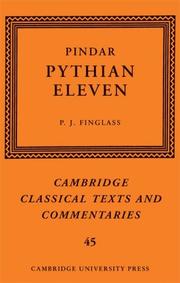
ISBN: 9780521884815 0521884810 9780511481406 9780521289900 0511481403 9780511379307 0511379307 1107186382 9781107186385 1281243841 9781281243843 9786611243845 6611243844 0511378432 9780511378430 0511376618 9780511376610 0511375085 9780511375088 051137755X 0521289904 Year: 2007 Volume: 45 Publisher: Cambridge Cambridge University Press
Abstract | Keywords | Export | Availability | Bookmark
 Loading...
Loading...Choose an application
- Reference Manager
- EndNote
- RefWorks (Direct export to RefWorks)
Pindar's Pythian Eleven is a miniature masterpiece: a poem praising a young athlete which presents a vivid and important account of the Agamemnon legend. Yet it contains so many difficulties (of text, metre, dating and interpretation) that even Wilamowitz regarded it as one of Pindar's most obscure poems. This 2007 edition (the first full-scale treatment that the poem had ever received) provides answers to the problems that have prevented proper appreciation of the work. In addition to the full introduction and commentary, the book also has a text based on re-examination of the manuscripts, detailed metrical discussion, and a translation.
Agamemnon (Greek mythology) --- Agamemnon, --- Agaiméamnón, --- Agamemno, --- Agamemnonas, --- Agamemnoni, --- Agamennone, --- Agamemnons, --- Agamenón, --- Agememnon, --- Ἀγαμέμνων, --- Αγαμέμνονας, --- أجاممنون --- آگاممنون --- Агамемнан, --- Агамемнон, --- 아가멤논, --- אגממנון --- アガメムノーン, --- 阿伽门农, --- Agamemnon (Greek mythology) - Poetry

ISBN: 9783598710155 3598710151 3111812219 3110953870 9783110953879 Year: 2008 Publisher: Berolini Novi Eboraci
Abstract | Keywords | Export | Availability | Bookmark
 Loading...
Loading...Choose an application
- Reference Manager
- EndNote
- RefWorks (Direct export to RefWorks)
Agamemnon, --- Clytemnestra, --- Drama. --- Drama --- Agamemnon (Greek mythology) --- Greek drama (Tragedy) --- Greek drama --- Agaiméamnón, --- Agamemno, --- Agamemnonas, --- Agamemnoni, --- Agamennone, --- Agamemnons, --- Agamenón, --- Agememnon, --- Ἀγαμέμνων, --- Αγαμέμνονας, --- أجاممنون --- آگاممنون --- Агамемнан, --- Агамемнон, --- 아가멤논, --- אגממנון --- アガメムノーン, --- 阿伽门农,
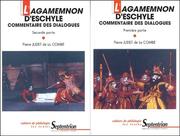
ISBN: 2859396276 2859396284 2859396292 2757422049 9782859396299 9782859396275 9782859396282 Year: 2001 Volume: 18 Publisher: Villeneuve-d'Ascq: Presses universitaires du Septentrion,
Abstract | Keywords | Export | Availability | Bookmark
 Loading...
Loading...Choose an application
- Reference Manager
- EndNote
- RefWorks (Direct export to RefWorks)
Ce livre donne une analyse détaillée de l’ensemble des scènes dialoguées de l’Agamemnon d’Eschyle, pièce qui ouvre la trilogie de l’Orestie (458 avant J.-C.). Il fait suite à l’ouvrage publié par Jean Bollack et Pierre Judet de La Combe, L’Agamemnon d’Eschyle. Le texte et ses interprétations, qui traitait des parties chorales de cette œuvre. La pièce se trouve ainsi commentée dans sa totalité. La perspective choisie est multiple : l’examen précis de la lettre du texte (qui débouche sur de très nombreuses interprétations nouvelles) s’accompagne d’une réflexion suivie sur la nature de la tragédie, sur ses innovations, sa langue, la manière dont elle construit le discours de ses personnages et sur l’histoire des lectures de ce drame depuis l’Antiquité. L’essai introductif fait le point sur les conflits d’interprétation que la tragédie a suscités chez les Modernes, et sur les questions générales qui se posent à l’interprète d’un tel texte : pertinence, ou non, du concept de tragique pour lire une tragédie ancienne, définition de ce qu’est un personnage dramatique, relation d’une telle œuvre avec ce que l’on sait de la langue, du droit, du mythe, de la poésie au ve siècle avant J.-C. à Athènes. La philologie critique affirme ainsi ses liens avec la philosophie, l’histoire et la sociologie. L’édition critique du texte et sa traduction feront l’objet d’un autre volume.
Greek drama (Tragedy) --- Dialogue analysis --- Tragédie grecque --- Analyse du dialogue --- History and criticism --- Histoire et critique --- Aeschylus --- Agamemnon, --- Criticism and interpretation --- Agamemnon (Greek mythology) in literature. --- Tragedy. --- Aeschylus. --- Tragédie grecque --- Agamemnon (Greek mythology) in literature --- Tragedy --- Drama --- Criticism and interpretation. --- Agaiméamnón, --- Agamemno, --- Agamemnonas, --- Agamemnoni, --- Agamennone, --- Agamemnons, --- Agamenón, --- Agememnon, --- Ἀγαμέμνων, --- Αγαμέμνονας, --- أجاممنون --- آگاممنون --- Агамемнан, --- Агамемнон, --- 아가멤논, --- אגממנון --- アガメムノーン, --- 阿伽门农, --- In literature. --- dialogue --- Agamemnon --- commentaire
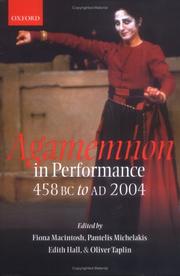
ISBN: 1280756632 0191514691 142942172X 9781429421720 9780191514692 9781280756634 9786610756636 6610756635 0199263515 9780199263516 019160836X 1383040540 Year: 2005 Publisher: Oxford Oxford University Press
Abstract | Keywords | Export | Availability | Bookmark
 Loading...
Loading...Choose an application
- Reference Manager
- EndNote
- RefWorks (Direct export to RefWorks)
This interdisciplinary, multi-author volume is devoted to the performance reception of Aeschylus's 'Agamemnon', the first play in a trilogy. The eighteen essays trace the story of the impact of this seminal play, from its original performance in Athens, through ancient Rome and the European Renaissance until the present day.
Aeschylus. --- Aeschylus --- Agamemnon, --- Agaiméamnón, --- Agamemno, --- Agamemnonas, --- Agamemnoni, --- Agamennone, --- Agamemnons, --- Agamenón, --- Agememnon, --- Ἀγαμέμνων, --- Αγαμέμνονας, --- أجاممنون --- آگاممنون --- Агамемнан, --- Агамемнон, --- 아가멤논, --- אגממנון --- アガメムノーン, --- 阿伽门农, --- Eskhil --- Eschylus --- Aischylos --- Esquilo --- Eschilo --- Aiskhilos --- Eshil --- Æskílos --- Ajschylos --- Eschil --- Esḳilos --- Eschyle --- Äschylos --- Eskili --- Aiszkhülosz --- Eschylos --- Iskilos --- Эсхил --- אייסכילוס --- איסכילאס --- איסכילוס --- إيسخولوس --- ايسخيلوس --- Αἰσχύλος --- Stage history. --- Performance --- Agamemnon (Greek mythology) --- Theatrical science --- Comparative literature
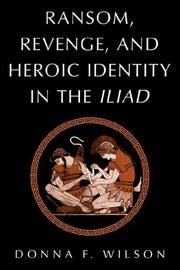
ISBN: 1107124085 0521032784 0511497792 0511044232 0511176805 0511329814 1280419172 0511157703 0511020392 9780511020391 9780511044236 9780511497797 9781280419171 9786610419173 6610419175 9780521032780 9780511176807 9780511329814 9780511157707 9781107124080 0521806607 9780521806602 9780521032780 Year: 2002 Publisher: Cambridge, UK New York, NY Cambridge University Press
Abstract | Keywords | Export | Availability | Bookmark
 Loading...
Loading...Choose an application
- Reference Manager
- EndNote
- RefWorks (Direct export to RefWorks)
From beginning to end of the Iliad, Agamemnon and Achilleus are locked in a high-stakes struggle for dominance based on their efforts to impose competing definitions of loss incurred and the nature of compensation thereby owed. This typology of scenes involving apoina, or 'ransom' and poine, or 'revenge' is the basis of Donna Wilson's detailed anthropology of compensation in Homer, which she locates in the wider context of agonistic exchange. Wilson argues that a struggle over definitions is a central feature of elite competition for status in the zero-sum and fluid ranking system characteristic of Homeric society. This system can be used to explain why Achilleus refuses Agamemnon's 'compensation' in Book 9, as well as why and how the embassy tries to mask it. Ransom, Revenge, and Heroic Identity in the Iliad thus examines the traditional semantic, cultural and poetic matrix of which compensation is an integral part.
Epic poetry, Greek --- Trojan War --- Identity (Psychology) in literature. --- Revenge in literature. --- Heroes in literature. --- History and criticism. --- Literature and the war. --- Homer. --- Agamemnon, --- Achilles --- Achìe --- Achilas --- Achille --- Achilleus --- Achilli --- Ahil --- Ahile --- Ahilej --- Ahillejs --- Aĥilo --- Aichill --- Akhilles --- Akhilleus --- Akhilleusz --- Akiles --- Akili --- Akille --- Akilles --- Akkilles --- Aquiles --- Aquilles --- Axill --- Axilles --- Ἀχιλλεύς --- آخيل --- アキレウス --- Akireusu --- 아킬레우스 --- 阿喀琉斯 --- Ахіл --- Ахил --- Ахилл --- Akhill --- Ахіллес --- אכילס --- Akhiles --- Agaiméamnón, --- Agamemno, --- Agamemnonas, --- Agamemnoni, --- Agamennone, --- Agamemnons, --- Agamenón, --- Agememnon, --- Ἀγαμέμνων, --- Αγαμέμνονας, --- أجاممنون --- آگاممنون --- Агамемнан, --- Агамемнон, --- 아가멤논, --- אגממנון --- アガメムノーン, --- 阿伽门农, --- Homer --- In literature --- In literature. --- Agamemnon (Greek mythology) in literature. --- Achilles (Greek mythology) in literature. --- Arts and Humanities --- History
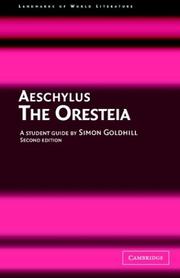
ISBN: 1107148790 9786612394652 1282394657 051164423X 0511800266 0511166079 0511164122 0511566743 0511164920 9780511164125 9780511164927 0511162529 9780511162527 9780521832298 0521832292 9780521539814 0521539811 9780511166075 9780511800269 9780511644238 0521832292 0521539811 9781107148796 661239465X 9781282394650 9780511566745 Year: 2004 Publisher: Cambridge [England] New York Cambridge University Press
Abstract | Keywords | Export | Availability | Bookmark
 Loading...
Loading...Choose an application
- Reference Manager
- EndNote
- RefWorks (Direct export to RefWorks)
This is the only general introduction in English to Aeschylus' Oresteia, one of the most important and most influential of all Greek dramas. It discusses the Greek drama festival and the social and political background of Greek tragedy, and offers a reading of this central trilogy. Simon Goldhill focuses on the play's themes of justice, sexual politics, violence, and the position of man within culture, and explores how Aeschylus constructs a myth for the city in which he lived. A final chapter considers the influence of the Oresteia on later theatre. Its clear structure and guide to further reading will make this an invaluable guide for students and teachers alike.
Greek drama (Tragedy) --- Tragedy. --- Drama --- History and criticism. --- Aeschylus. --- Orestes, --- Agamemnon, --- Electra --- Électre --- Alektra --- Ēlektra --- Elektro --- Elettra --- 厄勒克特拉 --- エーレクトラー --- אלקטרה --- 엘렉트라 --- Електра --- Электра --- الکترا --- اليكترا --- Ἀλέκτρα --- Ἠλέκτρα --- Agaiméamnón, --- Agamemno, --- Agamemnonas, --- Agamemnoni, --- Agamennone, --- Agamemnons, --- Agamenón, --- Agememnon, --- Ἀγαμέμνων, --- Αγαμέμνονας, --- أجاممنون --- آگاممنون --- Агамемнан, --- Агамемнон, --- 아가멤논, --- אגממנון --- アガメムノーン, --- 阿伽门农, --- Orest, --- Orestas, --- Oreste, --- Oresti, --- Oresto, --- Oresztész, --- オレステース, --- אורסטס --- 오레스테스, --- اورستس --- Орест, --- Ὀρέστης, --- Aeschylus --- In literature. --- Orestes (Greek mythology) in literature. --- Agamemnon (Greek mythology) in literature. --- Electra (Greek mythology) in literature. --- Arts and Humanities --- History
| Listing 1 - 7 of 7 |
Sort by
|

 Search
Search Feedback
Feedback About UniCat
About UniCat  Help
Help News
News